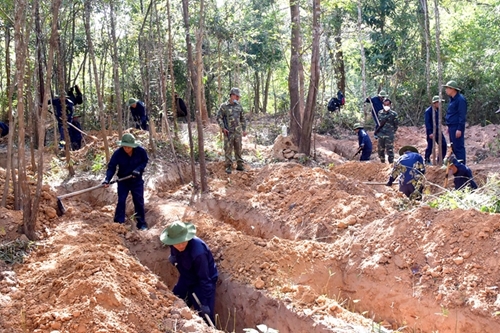Together effectively using provided budget, military units and localities have mobilized resources to enhance the efficiency of the search and collection of remains of fallen soldiers.
Striving for noble mission
Together with regular missions, units of the Military Region 2 Command are conducting the search and collection of martyrs' remains in six Northern provinces of Laos in the total area of 81,980s.q.km.
Despite difficulties posed by rugged terrains, harsh weather conditions, and language barriers, troops of the military region have found 1,835 sets of remains of fallen soldiers, including 387 identified martyrs.
    |
 |
|
The martyrs’ remains search and collection team of the Quang Tri provincial Military Command operates in Atsaphangthong district of Laos’ Savannakhet province. |
According to Deputy Political Commissar of Military Region 2 and Head of the military region’s Steering Committee 515 Major General Nguyen Hong Thai, the above-mentioned achievement attributed to the care by different levels. Particularly, after the Prime Minister issued Decision No.75/2013/QD-TTg on December 6, 2013 and Decision No.35/2017/QD-TTg on July 25, 2017 on policies and supplies for the martyr search and collection force, the military region’s Standing Party Committee has strictly directed the sufficient provision of material, equipment, and vehicles for the force and effective implementation of policies for the organizations and individuals as regulated. As a result, all officers and soldiers are well aware of their obligations, rights, and responsibilities and try their best to fulfill assigned duties.
Military Region 4 was an important strategic area in wartime. Soldiers laid down their lives in the area, and remains of many soldiers have not been found. At present, there are eight teams with from 15 to 80 members each in charge of searching and collecting remains of martyrs in Vietnam’s localities and Laos’. According to Deputy Political Commissar of Military Region 4 and Head of the military region’s Steering Committee 515 Senior Colonel Doan Xuan Buong, together with effectively utilizing provided budget, Military Region 4 has mobilized other resources for the task. From 2014, provinces in the region have allocated over VND 82 billion from their own budgets to facilitate the search and collection of martyrs’ remains. Of the total, more than VND 65 billion has been invested in building funeral houses and camps for the forces performing the mission in Laos and other welfare facilities.
    |
 |
|
The Ha Tinh provincial Military Command’s team performs mission in Vi Xuyen district. |
The above-mentioned actions prove that the Party, State, ministries, and local authorities have paid due attention to the work with synchronous and drastic solutions. According to the report of the National Steering Committee 515, following the Prime Minister’s decision, policies for the force have been fully and effectively implemented. The budget has been allocated, managed, and utilized for intended purposes, while the equipment and resources have been effectively managed, exploited, and used. Many localities and units have mobilized resources to enhance the efficiency of the work, contributing to meeting the hope of the people and martyrs’ families.
Mobilizing resources to remove difficulties
With the highest political determination, the force has run against time to search, collect, and repatriate remains of war martyrs. However, they have faced numerous difficulties, since the number of remains of fallen soldiers that have been founded are huge. In addition, the lack of information about martyrs and their burial sites, the changes of terrain, and shortcomings in carrying out policies add to the challenges.
The team of the Ha Giang provincial Military Command is tasked to conduct search and collection in an area mainly consisting of dense forests, mountains, rivers, and streams which make the transportation of multifunctional excavators to the area impossible. Meanwhile, specialized equipment, such as ground-penetrating radars have not been equipped.
The team of the Nghe An provincial Military Command has also had difficulties. The unit is assigned to conduct surveys, search, and collection of remains of martyrs in Laos’ provinces of Xiangkhouang, Vientiane, and Xaysomboun. According to head of the team Colonel Che Ngoc Ha, although the salary has been adjusted six times, the base-salary and allowances for the force are still low.
    |
 |
|
Forces performing mission in difficult terrain |
The aforementioned difficulties and issues are common across agencies and units involved in the search, collection, and repatriation of war martyrs' remains in the past period. The report presented at the conference reviewing the implementation of the Prime Minister's decisions on policies and supplies for the force pointed out these shortcomings and reasons.
The Office of the National Steering Committee 515 has collected opinions and suggested the Government and the Prime Minister issue new documents on policies and supplies work for organizations and individuals involved in the search, collection, and repatriation of war martyrs' remains in accordance with the provisions of the law. Along with that, it is necessary to leverage the strength of the political system, the role and responsibilities of agencies, organizations, and forces; enhance international cooperation; and mobilize resources to fulfill the set targets.
Translated by Tran Hoai